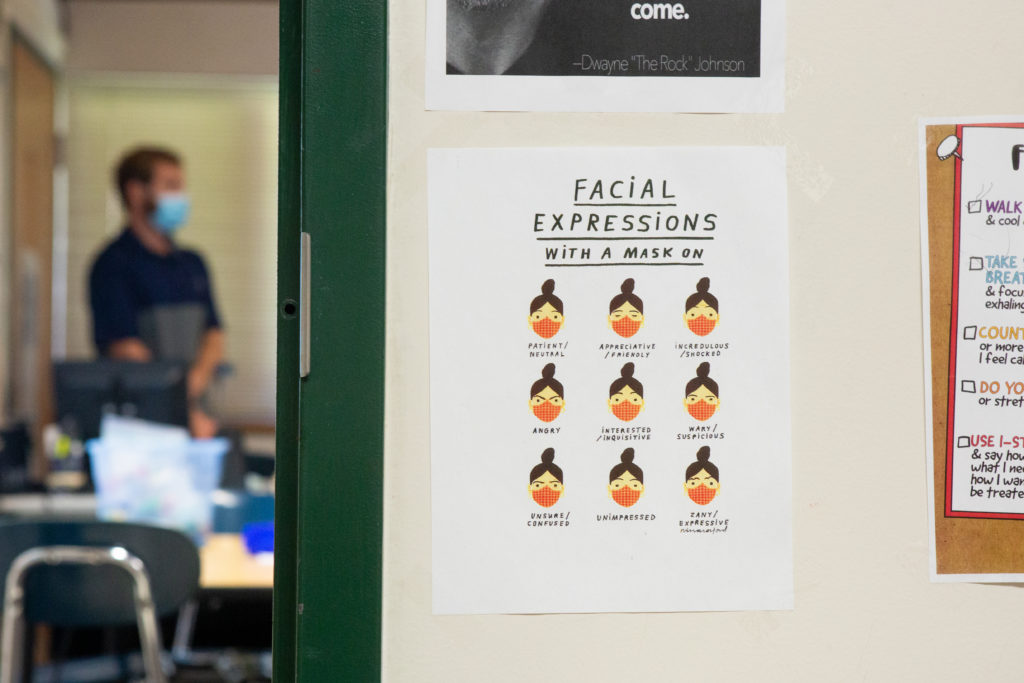Large urban districts object to Gov. Newsom’s school reopening plan
Coronavirus
Big urban districts object to Gov. Newsom'due south school reopening programme

They cite funding inequities and want the state to cover the full costs of testing
 Credit: Allison Shelley for American Education
Credit: Allison Shelley for American Education
A sign outside a classroom helps students sympathize what dissimilar facial expressions expect like while wearing a mask at school.
 Credit: Allison Shelley for American Pedagogy
Credit: Allison Shelley for American Pedagogy
A sign outside a classroom helps students understand what different facial expressions look similar while wearing a mask at school.
Superintendents of seven urban school districts, including the state's 4 largest, are strongly criticizing Gov. Gavin funding plan to let districts to reopen classrooms equally before long equally Feb. 15.
They are urging the governor to blueprint a unlike funding plan that considers their unique needs and warn: "If nothing changes, many students in loftier-need communities are at risk of beingness left behind."
Their criticisms, in a Jan. 6 letter, betoken they won't pursue the funding incentives for school reopening that Newsom tied to a serial of requirements as proposed. The unified districts are Los Angeles, San Diego, Long Embankment, Fresno, Oakland, San Francisco and Sacramento City.
"A funding model which supports but schools in communities less impacted by the virus is at odds with California's long-standing efforts to provide more back up to students from low-income families," they debate. "Information technology also reverses a decade-long commitment to equity-based funding."
While calling Newsom's Rubber Schools for All "a beginning toward recovery," their 7-page letter of the alphabet listed actions the state should take. They include:
- Full and divide country funding for Covid testing of staff and students in add-on to the district's standard funding. Newsom proposes $2 billion from Proposition 98, the formula that determines the K-12 portion of the Full general Fund, to districts that transport transitional kindergarten to Grade two past February. 15 and grades 3 to 6 by March 15. Districts would get between $450 to $700 per student, depending on their enrollment of English learners, depression-income, foster and homeless youths. Most of the 7 districts would get much more than the minimum funding that could comprehend costs of administering and collecting samples for the tests. Employees' insurance, private insurers and state Medi-Cal would pick up most of the cost of the tests, which a country-funded lab in Valencia would perform.
- Creation of one set of statewide, uniform Covid protocols, after "coordination" with labor leaders. That's instead of districts and counties negotiating their own agreements. All seven districts take stiff teacher unions that have delayed an earlier render to the classroom over safety issues. Once ready, the state should require all schools to render to school, the alphabetic character states. "No local stakeholder — whether a superintendent, school board, labor partner or customs arrangement — should have an effective veto over the reopening of classrooms," the superintendents said.
- An "immediate, all-hands-on-deck" land attempt to attack the spread of the virus in low-income communities — the predominant neighborhoods in the districts — where unemployment and the Covid rates are high. "Public health officials must tackle this claiming head-on, or we will be left with more of the same: connected high rates of the virus in low-income communities that brand it unsafe to reopen classrooms," the letter said.
- The designation of school-based health centers as providers of Covid testing and vaccinations, and so that they tin can be reimbursed, just every bit cities and third-political party providers similar CVS Pharmacy.
- Firsthand state funding of summer school and establishment of "learning loss recovery plans." Newsom indicated last calendar week that he would provide information on summer funding in presenting the country upkeep on Friday.
- More than funding for students with disabilities once there is in-person didactics.
The seven superintendents argue that nether the governor'due south programme they would be denied funding because of Covid infection rates they cannot command, they said.
Under Newsom'due south plan, districts could not brainstorm to ship students back to school until the infection rates had fallen beneath 28 cases per 100,000 residents. That would currently exclude virtually counties, simply rates in rural and more affluent districts will likely autumn below the threshold sooner than in urban areas, creating inequities, the superintendents stated. It'southward unlikely their districts could come across Newsom'southward reopening goal of Feb. 15 or even March fifteen, they said.
Dozens of school districts in Orange, San Diego, Kern, Marin and suburban and rural areas had already starting sending some students back to school before the latest surge. Those districts could reopen, but they'd receive extra funding only if they adopt a strict testing regimen and a union-backed checklist of rubber precautions.
The urban districts would become more than funding per pupil under Newsom'due south proposed disinterestedness-based formula — only it would be delayed until their infection rates fall below the 28 cases per 100,000. Meanwhile, districts similar Los Angeles and San Diego, which take begun all-encompassing testing, would not get reimbursed.
To get more reports like this ane, click here to sign upward for EdSource's no-price daily email on latest developments in instruction.
cawthorneglact1947.blogspot.com
Source: https://edsource.org/2021/large-urban-districts-object-to-gov-newsoms-school-reopening-plan/646413
0 Response to "Large urban districts object to Gov. Newsom’s school reopening plan"
Post a Comment